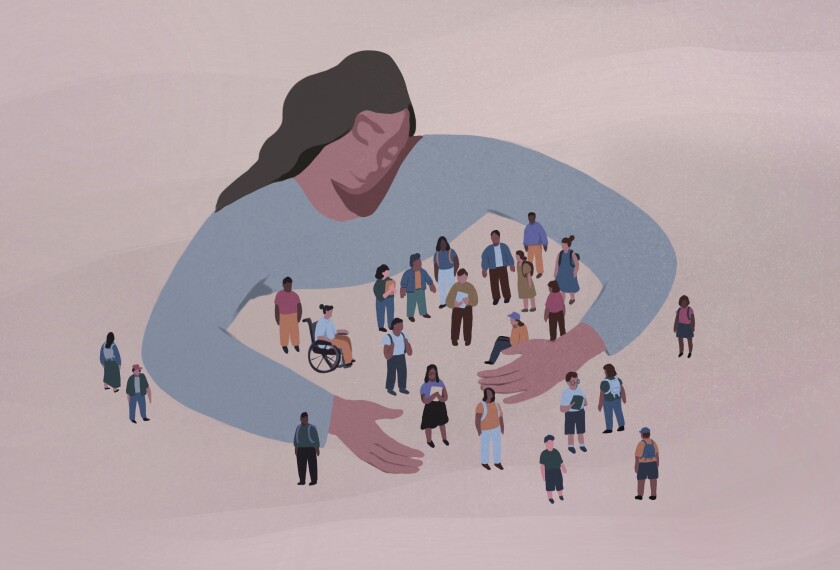From buying classroom supplies to working long after the school bell rings, teachers make countless sacrifices for the sake of other people’s children. Few ever imagined they’d also be asked to sacrifice the well-being of their own children, but that is exactly what is happening to many teachers who breastfeed. As the national wave of teacher strikes and walkouts moves into a second year, there is one important issue of dignity for teachers that has been left out of the conversation: breastfeeding accommodations.
“By mid-day my boobs were so full that I just began leaking everywhere—soaked through my shirt and sweater,” Catherine, an elementary school teacher, told us during our new study on breastfeeding discrimination through the Center for WorkLife Law at the University of California, Hastings College of the Law. While Catherine was willing to swallow the indignity of pumping in a closet or being walked in on by her colleagues, not getting any pumping break was too much to bear. “I started thinking, I’m here teaching these babies basic life skills, and I don’t even have the time to provide my own baby with food for survival.”
Nearly two-thirds of mothers who brought breastfeeding discrimination cases in the last decade lost their jobs.
In schools across the country, teachers like Catherine can be found huddled in closets, balancing their pumps awkwardly in toilet stalls, and hiding under their desks with their breasts out. “It is hard enough to find five minutes to take a bathroom break,” said one elementary school teacher we interviewed. “Pumping four times a day as a teacher is the hardest, worst, most stressful thing I’ve ever had to do,” said another.
Many teachers are left with no choice but to quit breastfeeding. Others, like Catherine, quit their jobs. Nearly two-thirds of all mothers who brought breastfeeding discrimination cases against their employers in the last decade lost their jobs, either because they were fired (43 percent) or forced to resign (20 percent), we found in our study. Those who didn’t lose their jobs outright often suffered other economic harms, like being forced to take unpaid leave.
Breastfeeding parents who are not provided reasonable accommodations also face health consequences, including illness, infection, and diminished milk supply. Some are forced to wean their babies earlier than doctors recommend. Infants who are not breastfed face worse health outcomes, including higher rates of Sudden Infant Death Syndrome and childhood leukemia. Their moms are at greater risk for breast cancer and heart disease.
Despite the harsh consequences of breastfeeding discrimination, federal law does not adequately protect breastfeeding teachers. Due to an unintended legal technicality, teachers are excluded from the protections of the Break Time for Nursing Mothers law, the federal requirement that employers provide workers with pumping space and break time. Because they aren’t covered by the law, many teachers struggle to get the basic accommodations they need.
Although other federal laws, the Pregnancy Discrimination Act and Title IX, prohibit firing or harassing a teacher because she is breastfeeding, those laws cannot be reliably counted on to provide break time and space to pump.
Given the federal government’s failure to provide adequate rights to teachers, some states have stepped in to fill the gap. Twenty-one states and the District of Columbia have laws clearly requiring break time and space for nearly all workers, including teachers. Other states have added to the patchwork: Texas and Montana cover public employees, while Louisiana and Virginia have passed laws specifically to protect breastfeeding educators.
Many administrators already realize the benefits of providing private pumping space and break time. Doing right by breastfeeding workers has been proven to reduce turnover, lower healthcare costs and the number of sick days taken, and boost morale—it ultimately saves money and keeps educators in the classroom. But all teachers deserve the dignity of breastfeeding accommodations, not just those fortunate enough to have an administrator with this foresight.
Including teachers, 27.6 million women of childbearing age in this country do not have the basic legal protections needed by all breastfeeding workers—a clear right to receive break time, space, and other reasonable accommodations.
In our recent report, we outline common-sense policy solutions to help teachers walk out of their closets and into clean, private pumping spaces. These include establishing clear space requirements that take the guesswork out of accommodating pumping workers and ensuring laws can be enforced in court. Critically, breastfeeding laws must cover workers in every industry and job title, including—at long last—teachers.
Providing basic accommodation for breastfeeding teachers is just one small and affordable way to give teachers the dignity at work they deserve.





